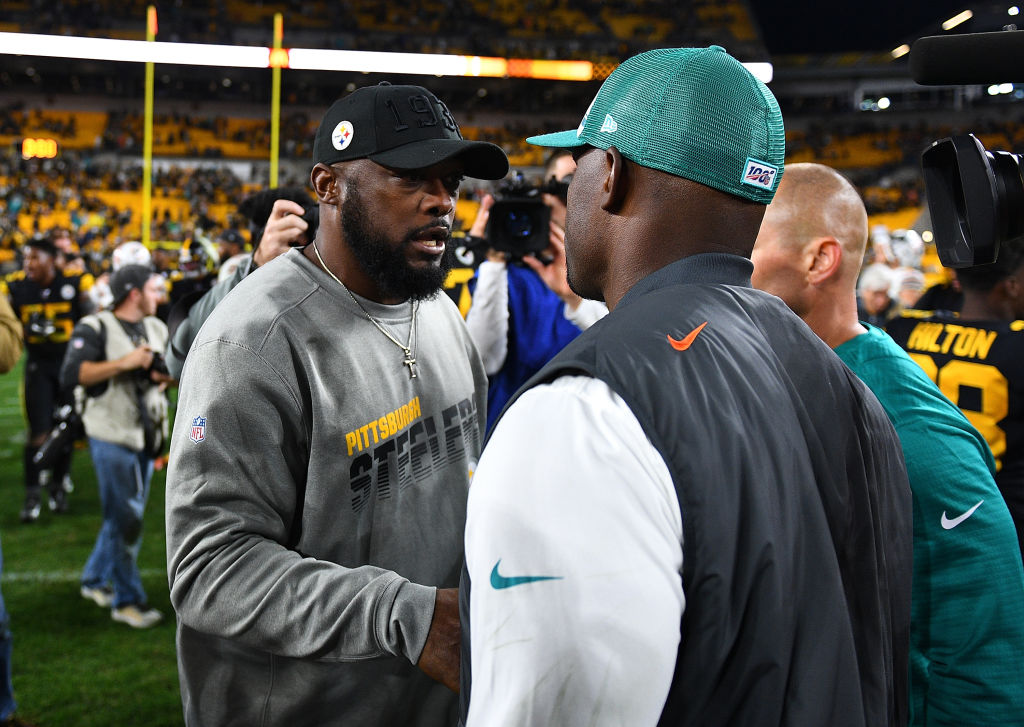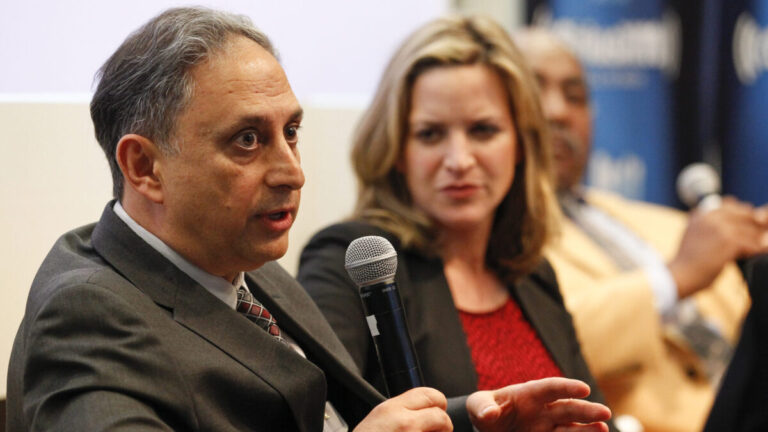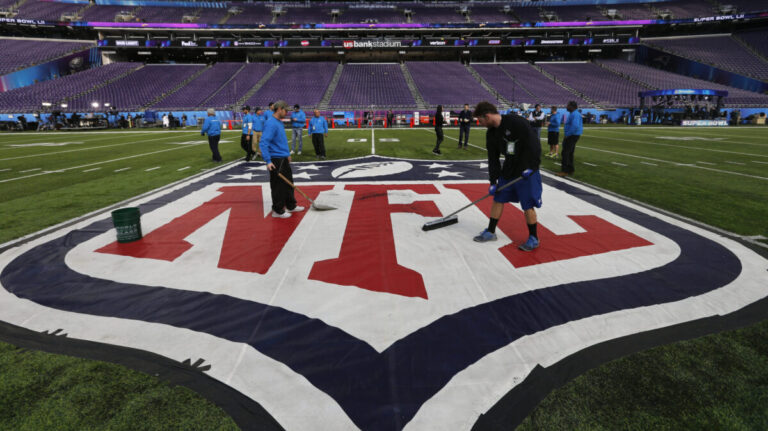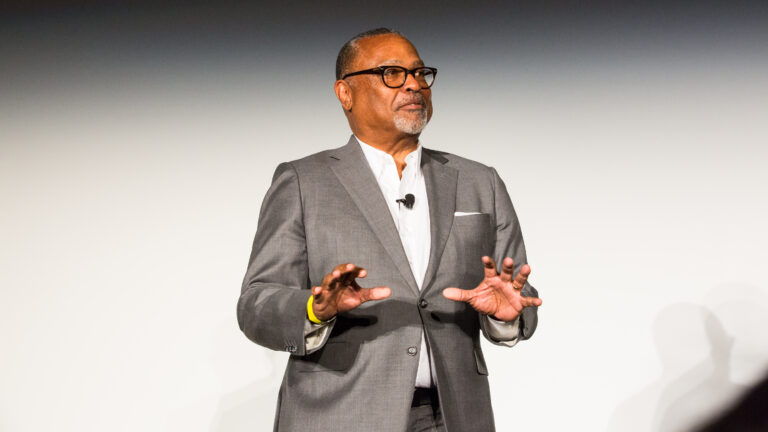A New NFL Hiring Cycle Begins Following Hopeful Firsts and Continued Stubbornness on Diversity
Why this matters
The NFL failed to improve upon its poor track record of diverse hiring at the head coach spots in 2021, and so far, the 2022 hiring cycle looks like it could follow the same troubling roadmap.
Following the recent dismissals of Houston Texans head coach David Culley and Miami Dolphins head coach Brian Flores, the National Football League has just one active Black head coach, Mike Tomlin of the Pittsburgh Steelers.
This paucity of diverse leadership is not what the NFL hoped for when it first adopted the Rooney Rule, which requires teams to interview minority candidates for open head coaching and other leadership positions, in 2003. Nor is it what diversity advocates around the league have been working toward in the years before and since.
However, Tomlin’s solitary status does reflect a continuing lack of equity in a league where 70 percent of the players are Black – as well as the ongoing and well-documented career advancement barriers that NFL coaches of Color continue to face.
As a head coach hiring cycle that already includes eight job openings gets underway, a look back at the 2021 offseason illustrates the persistence of those barriers:
- Of the seven head coaching hires, five were White men. The sixth was Robert Saleh, a Lebanese-American. The final was Culley, who got his first shot to be a head coach at 65 years old. His hiring was almost immediately followed by reports that he was merely keeping the seat warm for journeyman quarterback Josh McCown, who had an interview for the Texans’ head coaching job even though he had never coached above high school.
- Kansas City Chiefs offensive coordinator Eric Bieniemy, an experienced Black coach who has overseen one of the most potent offenses in the NFL and guided the career of its brightest young quarterback star, Patrick Mahomes, was again passed over despite interviewing with several teams in the 2019, 2020, and 2021 cycles.
- Jacksonville Jaguars franchise owner Shad Khan reportedly offered his team’s head coaching job to Urban Meyer, a career college coach who has had scandal at nearly every stop, and then went through the charade of interviewing a couple of Black candidates to fulfill the NFL’s Rooney Rule.
- While 14 teams had changes at the defensive coordinator position and six of those 14 jobs went to non-White men (five Black men and Sean Desai, an Indian-American), 13 teams chose new offensive coordinators and 11 of them appointed White men to the roles. The Miami Dolphins went with co-coordinators, one Black man (Eric Studesville) and one White man (George Godsey), while the San Francisco 49ers hired a biracial man, former run game coordinator Mike McDaniel, to the role.
There were some signs of progress. The New York Jets hired Saleh, making him the first Muslim to guide a team in the league’s 100-plus year history, and the Chicago Bears promoted Desai to defensive coordinator, also a first.
That said, the 2020-21 NFL regular season featured as many coordinators named Shane (Steichen in Philadelphia, Waldron in Seattle, and Bowen in Tennessee) as there were Black head coaches. Of those Black coaches, Culley was fired after a single season, while Flores was fired the day after the regular season ended, even though the Dolphins posted a 9-8 record following a 1-7 start.
With a 10-6 mark in 2020, Flores was the first Miami coach in 20 years to register back-to-back winning seasons. It still wasn’t good enough.
None of this is surprising. In the nearly two decades since the adoption of the Rooney Rule, 122 NFL head coaches have been hired. Only 17 of them were men of Color. And of that tiny cohort, only a handful – Lovie Smith, Romeo Crennel, Hue Jackson, Jim Caldwell, and Ron Rivera – have gotten a second chance to be a head coach.
So what gives? There are those who believe that the NFL knows there is a problem – and that the league wants nothing more than to see more head coaches and team decision-makers of Color. In 2020, the league expanded the Rooney Rule by requiring teams to interview at least two external minority candidates for head coach and general manager openings, and at least one minority candidate for any coordinator job.
Yet regardless of whatever rules the NFL institutes – and in fairness, the league office itself has made strides in terms of hiring more women and those from historically excluded backgrounds – it is team owners who make the final decision on what happens with their franchises.
“Remember, the commissioner is the employee of the 32 clubs,” says Amy Trask, former CEO of the Oakland Raiders. “Yes, the commissioner and the league office can work to implement changes, but, at the end of the day, it’s up to the 32 clubs, 31 of which are privately owned. Ultimately, this is up to the clubs.”
‘Enticement’ Vs. ‘Business Darwinism’
Last fall, the NFL again tweaked the Rooney Rule: Now teams must interview two non-White external candidates for general manager or executive director of football operations roles as well all coordinator openings instead of the previous one minority external candidate for those jobs. Head coach openings already had this requirement, which is why Jacksonville’s Khan had to go through the charade of interviewing Saleh, Bieniemy, and Raheem Morris, who at the time was the Atlanta Falcons’ interim head coach and defensive coordinator, even though he’d reportedly already told Meyer the Jaguars’ job was his if he wanted it.
In 2020, the league added an “enticement” of mid-round draft picks as a reward for teams that develop and then lose a non-White coach or front-office executive to another team, a grown-up gold star for doing something they should be doing.
Time and again, those associated with the NFL say that it’s a business. If that’s the case, then said business is not being run – at least at the level of individual teams – in the most effective way. Research shows that diverse and inclusive businesses are more profitable and make better decisions more efficiently. Yet year after year, NFL teams seem to disregard that data.
“I have hoped for a very, very, very long time that we would see something – and this is not specific to football but specific to sports – but a ‘business Darwinism’ where teams that do not hire in a diverse and inclusive manner fail, because they should fail,” Trask says. “A business that does not hire in a diverse and inclusive manner is hurting itself.
“If you have different views, different world outlooks, different ideas, you’re going to be a better business.”
Trask makes sure to note that she was fortunate to work for the late Al Davis. The longtime Raiders team owner recorded many firsts in his time: Trask was the first woman to be CEO of an NFL team, and Davis hired the first Latino head coach ever and first Black head coach of the modern era as well.
“[Davis] hired without regard to gender, ethnicity, race. … He knew those things don’t matter, have no bearing on a job,” Trask says. “I recognize how fortunate I was because not everyone does what Al did. He was ages ahead.”
What Are the Qualifications?
There is talk every year of strengthening the career pipeline and getting more non-White coaches into positions where they can be seen as potential head coaching candidates. That can’t happen overnight, of course, but just getting into that pipeline is incredibly difficult for coaches of Color.
In 2019, researchers at Arizona State University’s Global Sport Institute examined hiring practices by NFL teams over the previous decade, and those findings have been updated to include hires made after the 2020 season.
The demographics of the head coaching hires are one thing, but there’s also a career path head coaches usually follow: position coach, coordinator, head coach. Over the past several years, as there has been more and more emphasis on quarterback play and rules meant to increase scoring, that path has increasingly meant coaching offense, and since 2016, a full three-quarters of the 40 head coaches hired have come from that phase of the game. Nine were from defense, and one was a special teams coordinator.
For the 2021 season, seven of 33 offensive coordinators are minorities, all of them Black (the Dolphins had co-coordinators). Just four of the quarterbacks coaches, most often the position that gets promoted to coordinator, are minorities – again, all Black. No team has both a Black offensive coordinator and a Black quarterbacks coach. Since the Rooney Rule was instituted – though it initially was only for head coaching interviews, not coordinators – just 25 of 244 offensive coordinator jobs have gone to non-White men (23 Black and one Chinese-American).
For the 2021 season, 12 of the league’s 33 defensive coordinators were non-White (the Minnesota Vikings have co-coordinators, one White and one Black), and a surprising eight of 32 specials teams coordinators were minorities. There were two head coaches who were special teams coordinators immediately before being selected for head coach roles (one, the New York Giants’ Joe Judge, was recently fired), so while there are those who believe special teams coordinators make good sense as head coaches because they have experience working with pretty much every player on a roster, those coordinators usually don’t jump to head coaching jobs. Still, the eight Black special teams coordinators is noteworthy.
When he was hired in 2019, Tampa Bay Buccaneers head coach Bruce Arians chose Black coaches to be his offensive, defensive, and special teams coordinators – a group believed to be a first in NFL history. Arians’ staff also includes two women, another NFL first.
One other trend GSI researchers found is that White coordinators and head coaches historically have been able to rise to that level even if they themselves were not accomplished football players. Of the 18 non-White offensive and defensive coordinators in 2021, 14 (77.7 percent) played NCAA Division I football or beyond compared to just 29 of 49 (59.2 percent) White coordinators who played at that level. Miami co-coordinator Eric Studesville is the first non-White man to rise to the offensive coordinator level without playing at the highest level of college football or beyond.
For years, Black players were systematically excluded from the quarterback position because of the racist idea that they weren’t smart enough or weren’t capable leaders. That has changed. Week 1 of the 2021 regular season saw nine teams with Black starting quarterbacks and a few more that had Black backups. If history is a guide, that will likely lead to more Black coaches in the future, but should that be the case? Is that fair?
“When you look at the great Black coaches now, what do they all have in common? They had to have played,” former New York Giants personnel executive Marc Ross told me last year. “The greatness – you have to be a great high school player, you have to be a great college player, you have to be an NFL player to make it and be an NFL head coach. That’s the standard that we face now, and it’s still not good enough. That’s the problem, and that’s not right.
“Despite all the greatness you may exhibit throughout your entire career, it’s still not good enough, but White coaches … don’t need to have excellence at every level in order to keep getting opportunities, and that’s a major, major problem.”
The argument can certainly be made that having playing experience can be an asset. Former players who retire and move into coaching don’t just know the game. They know what they did and did not like about coaches they had throughout their careers, and that can influence their approach and make them better at the job. But if playing at a high level is or becomes an expectation, it should be an expectation for all candidates, not just non-White ones.
On average, non-White coaches are older than White coaches when they first reach the coordinator or head coach level. Culley isn’t just the fourth-oldest head coach in the league; he’s also the oldest first-time head coach in modern league history.
Nagging Nepotism
One other big problem for non-White coaches that is getting more attention: nepotism.
By the NFL’s own data for its 2020 diversity and inclusion report, nine of that year’s 32 head coaches were related to a current or former coach in the league, whether by blood or marriage. That’s an unmistakable leg up. Consider Zac Taylor, named head coach of the Cincinnati Bengals in 2019. Taylor had entered the NFL coaching ranks just seven years earlier, as the Dolphins assistant quarterbacks coach. His father-in-law is longtime coach Mike Sherman, who was offensive coordinator in Miami and gave Taylor that first job in the league.
Of course, it’s not just head coaches whose family ties help. It’s coordinators and position coaches, too. The NFL’s diversity and inclusion report said 63 coordinators or position coaches, 53 of them white, were related to a current or former coach by blood or marriage, but a recent investigation by Defector put the number even higher than that. Defector’s count is 111 of 792 coaches, or 14 percent, listed on team websites as a coaching assistant (usually the lowest rung on the ladder) or higher are related to a current or former coach. Of those 111, 78.3 percent are White.
The Las Vegas Raiders have a league-high nine coaches who are related to a current or former coach, while the New England Patriots and Denver Broncos have eight each. Patriots head coach Bill Belichick, who has long declared that he runs his roster as a meritocracy, has both of his sons on his staff. Older son Steven is the team’s outside linebackers coach and defensive play-caller (thus making him de facto coordinator), and younger son Brian coaches safeties.
Vikings head coach Mike Zimmer promoted his own son, Adam, to co-defensive coordinator in 2020, when he had just nine years of coaching experience. The other coordinator he promoted, Andre Patterson, is a Black man who had 16 years of experience coaching in the NFL and an additional 21 coaching at the high school and college levels, including as a head coach at FCS program Cal Poly. (In fairness, Patterson’s son is on Minnesota’s staff as well, as assistant running backs coach.)
In all, five head coaches had their own children on their coaching staffs when the 2021 season began. Before resigning in disgrace midseason, former Las Vegas head coach Jon Gruden hired his son Deuce onto the team’s strength and conditioning staff (and before his father was hired with the Raiders, Deuce worked on uncle Jay’s staff with the Washington Football Team). Adam Zimmer isn’t the only son on the Vikings’ staff who clearly got an advantage because of his last name. Offensive coordinator Klint Kubiak is the son of Gary. Gary Kubiak was Minnesota’s assistant head coach and offensive coordinator from 2019 until his early 2021 retirement, and then his son, whom he had been grooming for the job, just slid into the role despite beginning his coaching career just 11 years earlier. The Vikings did fulfill the Rooney Rule by interviewing one Black outside candidate, but this is yet another case of a team following the letter but not the spirit of the rule.
For the 2021 season, there were at least eight offensive and three defensive coordinators related to a current or former coach. All of them are White.
Related: How NFL Teams Can Be More Inclusive And Uphold the Spirit of the Rooney Rule
Once owners or general managers decide on their head coaches, they have little to no influence over the assistants who are hired, and, in many cases, assistants are not carefully vetted, if at all. They just know someone. Merit or experience doesn’t matter as much as relationships.
So for all the talk about “pipeline,” this is what non-White coaches are up against. Chances are they aren’t related to former head coaches because of the 416 men who have been a full-time head coach in the 102-year history of the league, only 25 are non-White. The data shows that they have to have played the game at a high level to even get a chance, though more than likely that chance will be on the defensive side and 75 percent of head coaches the past five years came from the offensive side. Multiple teams in recent years have paid lip service to the Rooney Rule by conducting the required interviews after they’ve settled on and even offered the job to a White candidate.
Given that it’s been almost 20 years and we’ve seen the Rooney Rule effect little change despite several adjustments and now-annual attention paid to the dearth of non-White coaches in top positions, is there any hope it will work?
“I wish I knew the answer to that. I want it to work. I hope it works,” Trask says. “I’ll say again: It’s shameful that there has to be a rule to get people to do the right thing. Will it work? I don’t know.”





